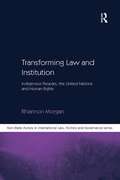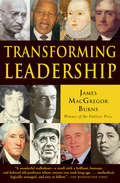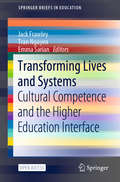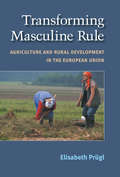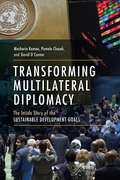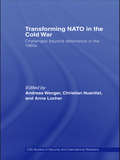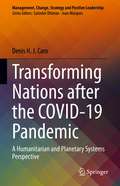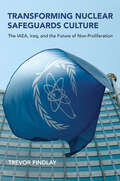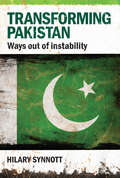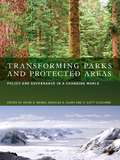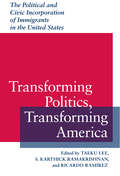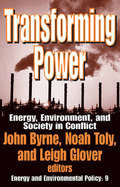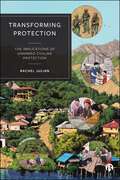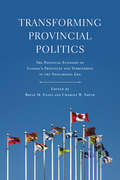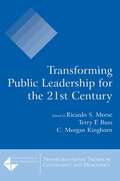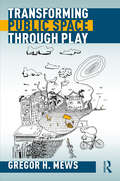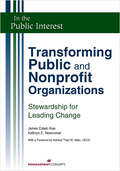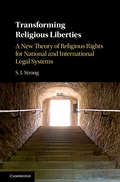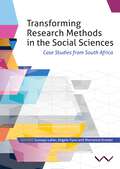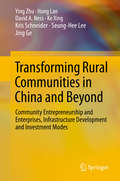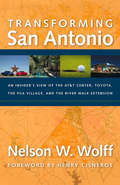- Table View
- List View
Transforming Law and Institution: Indigenous Peoples, the United Nations and Human Rights (Non-State Actors in International Law, Politics and Governance Series)
by Rhiannon MorganIn the past thirty or so years, discussions of the status and rights of indigenous peoples have come to the forefront of the United Nations human rights agenda. During this period, indigenous peoples have emerged as legitimate subjects of international law with rights to exist as distinct peoples. At the same time, we have witnessed the establishment of a number of UN fora and mechanisms on indigenous issues, including the UN Permanent Forum on Indigenous Issues, all pointing to the importance that the UN has come to place on the promotion and protection of indigenous peoples' rights. Morgan describes, analyses, and evaluates the efforts of the global indigenous movement to engender changes in UN discourse and international law on indigenous peoples' rights and to bring about certain institutional developments reflective of a heightened international concern. By the same token, focusing on the interaction of the global indigenous movement with the UN system, this book examines the reverse influence, that is, the ways in which interacting with the UN system has influenced the claims, tactical repertoires, and organizational structures of the movement.
Transforming Leadership
by James MacGregor BurnsIn Transforming Leadership, Burns illuminates the evolution of leadership structures, from the chieftains of tribal African societies, through Europe's absolute monarchies, to the blossoming of the Enlightenment's ideals of liberty and happiness during the American Revolution. Along the way he looks at key breakthroughs in leadership and the towering leaders who attempted to transform their worlds-Elizabeth I, Washington, Jefferson, Gandhi, Eleanor Roosevelt, Gorbachev, and others. Culminating in a bold and innovative plan to address the greatest global leadership challenge of the twenty-first century, the long-intractable problem of global poverty, Transforming Leadership will arouse discussion and controversy in classrooms and boardrooms throughout the country.
Transforming Lives and Systems: Cultural Competence and the Higher Education Interface (SpringerBriefs in Education)
by Jack Frawley Tran Nguyen Emma SarianThis open access book explores the transformative experiences of participants in the University of Sydney’s National Centre for Cultural Competence (NCCC) programs. The establishment of the NCCC was viewed as a critical point of departure for developing an institution-wide agenda of cultural competence. The NCCC’s work since its inception reflects efforts to lay important foundations for cultural change at the University. With the ultimate aim of establishing cultural competence as an agent for transformational change and social justice education, the NCCC has steadily expanded its research and teaching work both within and beyond the University of Sydney. Further, it has developed foundational resources to support and encourage University staff to integrate cultural competence philosophy and pedagogy in their curricula, teaching and research. This includes the ability to engage meaningfully with the cultures, histories and contemporary issues in Aboriginal and Torres Strait Islander communities. The NCCC programs have been designed to encourage participants to learn about who they are and how they can positively impact the transformational change the University has begun.The book presents participants’ reflections on their experiences at the organisational and personal level. Readers will gain insights into a range of topics including cultural competence, communities of practice, policy implementation, and transformative leadership at the interface between higher education and professional lives.
Transforming Masculine Rule: Agriculture and Rural Development in the European Union
by Elisabeth Prugl"The premise of mainstreaming gender is to bring equality concerns into every aspect of policy-making, and this brave book offers a close look at how feminists have taken up the challenge to transform the hidden dynamics of male domination in agricultural policy in Europe. In contrast to the automatic assumption that (neo)liberal policy always works against women’s interests, Prügl demonstrates the potential for feminist ju-jitsu to take advantage of multiple levels of governance to empower women in some circumstances. Although feminists were not always successful, the story of their efforts to remake agricultural policy should encourage activists to look for points of leverage in this and other contested and changing multilevel power systems. " ---Myra Marx Ferree, University of Wisconsin "Information on policy development, conflicts about improving the status of farm women, and using rural development policies to foster gender equality is hard to access in English and extremely useful for researchers concerned with the specifics of gender equality policy in the EU. " ---Alison Woodward, Institute for European Studies, Vrije Universiteit Brussel "This book is a must-read for scholars interested in the gendered process of global restructuring. Elisabeth Prügl succeeds superbly in teasing out the power politics involved in European agricultural policy. Through the lens of a feminist-constructivist approach, she makes visible the multiple mechanisms of gendered power within the state. This very lucid narrative is a milestone in a new generation of feminist theoretical scholarship. " ---Brigitte Young, University of Muenster, Germany Taking West and East Germany as case studies, Elisabeth Prügl shows how European agricultural policy has cemented long-standing gender-based inequalities and how feminists have used liberalization as an opportunity to challenge such inequalities. Through a comparison of the EU’s rural development program known as LEADER as it played out in the Altmark region in the German East and in the Danube/Bavarian Forest region in the West, Prügl provides a close-up view of the power politics involved in government policies and programs. In identifying mechanisms of power (refusal, co-optation, compromise, normalization, and silencing of difference), Prügl illustrates how these mechanisms operate in arguments over gender relations within the state. Her feminist-constructivist approach to global restructuring as a gendered process brings into view multiple levels of governance and the variety of gender constructions operating in different societies. Ultimately, Prügl offers a new understanding of patriarchy as diverse, contested, and in flux. Jacket photograph: © iStockphoto. com/Wojtek Kryczka
Transforming Mental Health Services: Implementing the Federal Agenda for Change, First Edition
by Howard H. Goldman Jeffrey A. Buck Kenneth S. ThompsonThis compendium of 17 articles addresses the goals set forth by the President's New Freedom Commission on Mental Health in its 2003 report, Achieving the Promise: Transforming Mental Health Care in America. The report represents the first time since the Carter Administration that such a high-level group evaluated U.S. mental health care.
Transforming Multilateral Diplomacy: The Inside Story of the Sustainable Development Goals
by Macharia Kamau Pamela Chasek David O'ConnorTransforming Multilateral Diplomacy provides the inside view of the negotiations that produced the UN Sustainable Development Goals (SDGs). Not only did this process mark a sea change in how the UN conducts multilateral diplomacy, it changed the way the UN does its business. This book tells the story of the people, issues, negotiations, and paradigm shifts that unfolded through the Open Working Group (OWG) on SDGs and the subsequent negotiations on the 2030 Sustainable Development Agenda, from the unique point of view of Ambassador Macharia Kamau, and other key participants from governments, the UN Secretariat, and civil society.
Transforming NATO in the Cold War: Challenges beyond Deterrence in the 1960s (CSS Studies in Security and International Relations)
by Andreas Wenger Christian Nuenlist Anna LocherThe first comprehensive history of NATO in the 1960s, based on the systematic use of multinational archival evidence. This new book is the result of a gathering of leading Cold War historians from both sides of the Atlantic, including Jeremi Suri, Erin Mahan, and Leopoldo Nuti. It shows in great detail how the transformation of NATO since 1991 has opened up new perspectives on the alliance’s evolution during the Cold War. Viewed in retrospect, the 1960s were instrumental to the strengthening of NATO's political clout, which proved to be decisive in winning the Cold War – even more so than NATO's defense and deterrence capabilities. In addition, it shows that NATO increasingly served as a hub for state, institutional, transnational, and individual actors in that decade. Contributions to the book highlight the importance of NATO's ability to generate "soft power", the scope and limits of alliance consultation, the important role of common transatlantic values, and the growing influence of small allies. NATO's survival in the crucial 1960s provides valuable lessons for the current bargaining on the purpose and cohesion of the alliance. This book will be of much interest to students of international history, Cold War studies and strategic studies.
Transforming Nations after the COVID-19 Pandemic: A Humanitarian and Planetary Systems Perspective (Management, Change, Strategy and Positive Leadership)
by Denis H. CaroIn 2020, the world is in the throes of the COVID-19 global pandemic—an epidemic the likes of which humankind has not experienced for decades. This book speaks to common and fundamental underlying issues that national communities face from a humanitarian and planetary systems perspective. From the globalization initiatives of the last decades, a dynamic and interconnected new planetary system order is emerging.This book underscores the need for decent, ethical, healthy, and just societies that enable individuals to reach full human potential. It explores the future directions of 12 Key Strategic Influencer (KSI) nations through 18 systemic factors that will shape the contours of future planetary governance this century. Finally, it proposes a nonconventional systems paradigm to humanitarian challenges.
Transforming Nuclear Safeguards Culture: The IAEA, Iraq, and the Future of Non-Proliferation (Belfer Center Studies in International Security)
by Trevor FindlayThe role of organizational culture in international efforts to stop the spread of nuclear weapons.In Transforming Nuclear Safeguards Culture, Trevor Findlay investigates the role that organizational culture may play in preventing the spread of nuclear weapons, examining particularly how it affects the nuclear safeguards system of the International Atomic Energy Agency (IAEA), the paramount global organization in the non-proliferation field. Findlay seeks to identify how organizational culture may have contributed to the IAEA&’s failure to detect Iraq&’s attempts to acquire illicit nuclear capabilities in the decade prior to the 1990 Gulf War and how the agency has sought to change safeguards culture since then. In doing so, he addresses an important piece of the nuclear nonproliferation puzzle: how to ensure that a robust international safeguards system, in perpetuity, might keep non-nuclear states from acquiring such weapons. Findlay, as one of the leading scholars on the IAEA, brings a valuable holistic perspective to his analysis of the agency&’s culture. Transforming Nuclear Safeguards Culture will inspire debate about the role of organizational culture in a key international organization—a culture that its member states, leadership, and staff have often sought to ignore or downplay.
Transforming Pakistan: Ways Out of Instability (Adelphi series)
by Hilary SynnottThis book argues that any strategy for dealing with Pakistan requires an understanding of the country’s complex and turbulent history and of the weaknesses of its political and other institutions. It describes how, in the absence of an inherent national identity, successive military and civilian governments have made use of Islam and Kashmir, ‘the unfinished business of Partition’, for political purposes. It also examines the role of the army and of its intelligence service, the ISI, in relation to India, Afghanistan and internal political manipulation. The nature and history of the tribal regions in Pakistan and Afghanistan, which are little understood in the West and which explain much of the animosity towards the US, are also described in detail. After 9/11, Pakistan's support for counter-terrorism and military operations in Afghanistan increased the population’s animosity towards the West and hence the government’s difficulties in delivering. Meanwhile, the military leadership hedged its bets by maintaining links with militant organisations and with a re-emerged Taliban. With the arrival of an elected leadership, the emergence of simultaneous political, economic and security crises, tactical errors by the West, and the Mumbai terrorist attacks in late 2008, the situation was complicated further. The book concludes with recommendations, aimed particularly at the new US administration, for a durable long-term relationship with Pakistan, entailing increased attention and resources devoted to institution-building and, over time, the reduction of the role and influence of the army.
Transforming Parks and Protected Areas: Policy and Governance in a Changing World
by Kevin S. Hanna Douglas A. Clark D. Scott Slocombe**This title was originally published in 2007. The version published in 2012 is a PB reprint of the original HB** The protection of natural resources and biodiversity through protected areas is increasingly based on ecological principles. Simultaneously the concept of ecosystem-based management has become broadly accepted and implemented over the last two decades. However, this period has also seen unprecedented rapid global social and ecological change, which has weakened many protection efforts. These changes have created an awareness of opportunities for innovative approaches to managing protected areas and of the need to integrate social and economic concerns with ecological elements in protected areas and parks management. A rare collection of articles that fuses academic theory, critique of practice and practical knowledge, Transforming Parks and Protected Areas analyzes and critiques these theories, practices, and philosophies, looking in-detail at the emerging issues in the design and operation of parks and protected areas. Addressing critical dynamics and current practices in parks and protected areas management, the excellent volume goes well beyond simple managerial solutions and descriptions of standard practice. With contributions from leading academics and practitioners, this book will be of value to all those working within ecology, natural resources, conservation and parks management as well as students and academics across the environmental sciences and land use management.
Transforming Politics, Transforming America: The Political and Civic Incorporation of Immigrants in the United States (Race, Ethnicity, and Politics)
by Taeku Lee Ricardo Ramírez S. Karthick RamakrishnanOver the past four decades, the foreign-born population in the United States has nearly tripled, from about 10 million in 1965 to more than 30 million today. This wave of new Americans comes in disproportionately large numbers from Latin America and Asia, a pattern that is likely to continue in this century. In Transforming Politics, Transforming America, editors Taeku Lee, S. Karthick Ramakrishnan, and Ricardo Ramírez bring together the newest work of prominent scholars in the field of immigrant political incorporation to provide the first comprehensive look at the political behavior of immigrants.Focusing on the period from 1965 to the year 2020, this volume tackles the fundamental yet relatively neglected questions, What is the meaning of citizenship, and what is its political relevance? How are immigrants changing our notions of racial and ethnic categorization? How is immigration transforming our understanding of mobilization, participation, and political assimilation? With an emphasis on research that brings innovative theory, quantitative methods, and systematic data to bear on such questions, this volume presents a provocative evidence-based examination of the consequences that these demographic changes might have for the contemporary politics of the United States as well as for the concerns, categories, and conceptual frameworks we use to study race relations and ethnic politics. Contributors Bruce Cain (University of California, Berkeley) * Grace Cho (University of Michigan) * Jack Citrin (University of California, Berkeley) * Louis DeSipio (University of California, Irvine) * Brendan Doherty (University of California, Berkeley) * Lisa García Bedolla (University of California, Irvine) * Zoltan Hajnal (University of California, San Diego) * Jennifer Holdaway (Social Science Research Council) * Jane Junn (Rutgers University) * Philip Kasinitz (City University of New York) * Taeku Lee (University of California, Berkeley) * John Mollenkopf (City University of New York) * Tatishe Mavovosi Nteta (University of California, Berkeley) * Kathryn Pearson (University of Minnesota) * Kenneth Prewitt (Columbia University) * S. Karthick Ramakrishnan (University of California, Riverside) * Ricardo Ramírez (University of Southern California) * Mary Waters (Harvard University) * Cara Wong (University of Michigan) * Janelle Wong (University of Southern California)
Transforming Power: Energy, Environment, and Society in Conflict (Energy And Environmental Policy Ser. #Vol. 9)
by Dietrich KebschullIn 1934, Lewis Mumford critiqued the industrial energy system as a key source of authoritarian economic and political tendencies in modern life. Recent debate continues to engage issues of energy authoritarianism, focusing on the contest between energy-driven globalization (the spread of energy deregulation and the simultaneous consolidation of the oil, coal, and gas industries) and the so-called "sustainable energy" strategy that celebrates the local and community scale characteristics of renewable energy. Including theoretical inquiries and case studies by distinguished writers, Transforming Power is divided into three parts: Energy, Environment, and Society; The Politics of Conventional Energy; and The Politics of Sustainable Energy. It interrogates current contemporary energy assumptions, exploring the reflexive relationship between energy, environment, and society, and examining energy as a social project. Some of these have promised a prosperous future founded upon technological advances that further modernize the modern energy system, such as "inherently safe" nuclear power, environmentally friendly coal gasification, and the advent of a wealthier, cleaner world powered by fuel cells; and the "green technologies," said by advocates to prefigure a revival of human scale development, local self-determination, and a commitment to ecological balance. br This volume offers a timely engagement of the social issues surrounding energy conflicts and contradictions. It will be of interest to policymakers, energy and environmental experts, sociologists, and historians of technology.
Transforming Protection: The Implications of Unarmed Civilian Protection
by Rachel JulianUnarmed Civilian Protection (UCP) is practised globally by civilians protecting fellow civilians without the use of weapons. This book argues that while UCP is useful and transformative in its own right, its principles and values mean it has the potential to transform our responses in a range of social contexts where there is violence. Chapters investigate the relationship between power, protection and peace; community-led aspects of protection; and successful behaviours and actions in protection. The book argues that when UCP is accepted as a viable form of protection from direct violence, there are wider implications for communities, security and violence. In turn, these insights can provide us with new models for ensuring people’s safety.
Transforming Provincial Politics
by Charles W Smith Bryan M. EvansOver the past thirty-five years, Canada's provinces and territories have undergone significant political changes. Abandoning mid-century Keynesian policies, governments of all political persuasions have turned to deregulation, tax reduction, and government downsizing as policy solutions for a wide range of social and economic issues. Transforming Provincial Politics is the first province-by-province analysis of politics and political economy in more than a decade, and the first to directly examine the turn to neoliberal policies at the provincial and territorial level.Featuring chapters written by experts in the politics of each province and territory, Transforming Provincial Politics examines how neoliberal policies have affected politics in each jurisdiction. A comprehensive and accessible analysis of the issues involved, this collection will be welcomed by scholars, instructors, and anyone interested in the state of provincial politics today.
Transforming Public Leadership for the 21st Century
by Terry F. Buss Ricardo S. Morse C. Morgan KinghornThe forces of globalization are shifting our world, including the public sector, away from hierarchy and command and control toward one of collaboration and networks. The way public leadership is thought about and practiced must be, and is being, transformed. This volume in the "Transformational Trends in Governance & Democracy" series explores what the shift looks like and also offers guidance on what it should look like. Specifically, the book focuses on the role of "career leaders" - those in public service - who are agents of change not only in their own organizations, but also in their communities and policy domains. These leaders work in network settings, making connections and collaborating to create public value and advance the common good. Featuring the insights of an authoritative group of contributors, the volume offers a mix of scholarship, from philosophical discussions to conceptual models to empirical studies that, taken together, will help inform the transformation of public leadership that is already underway.
Transforming Public Space through Play
by Gregor H. MewsThis book provides an empirical analysis of the concept of play as a form of spatial practice in urban public spaces. The introduced City–Play–Framework (CPF) is a practical urban analysis tool that allows urban designers, landscape architects and researchers to develop a shared awareness when opening up this window of possibility for adventure. Two case studies substantiate and illustrate the development process and testing of the framework in Canberra, Australia, and Potsdam, Germany. The appropriation of public spaces that transcend boundaries can facilitate an intrinsic connection between people and their immediate environment, towards a more joyful ontological state of human existence in which imagination, co-creation and a sense of agency are key elements of the design approach. The framework presents an alternative understanding of public spaces and public life, reflecting on theory and its implications for practice in a post-pandemic world in dense urban centres. A bridge between theory and practice, this book explores possibilities on what future design ought to be when openness and ambiguity are consciously integrated parts of practice and process. The book presents a valuable discussion on public space and play for academic audiences across a wide range of disciplines such as landscape architecture, urban design, planning, architecture and urban sociology, which is informative for future practice.
Transforming Public and Nonprofit Organizations: Stewardship for Leading Change
by James E. Kee JD, MPA Kathryn E. Newcomer PhDIn the public and nonprofit arenas, leaders face the unique challenge of protecting the public interest while implementing organizational change initiatives. To succeed, these leaders must build organizations that are "change-centric," carefully weigh and prepare for the risks of change, and develop a change-oriented leadership style that authors Kee and Newcomer call transformational stewardship.A comprehensive approach to leading change, Transforming Public and Nonprofit Organizations: Stewardship for Leading Change provides public and nonprofit leaders and students of leadership, management, and organizational change with theoretical knowledge and practical tools for accomplishing change goals while protecting the broader public interest. This insightful and useful guide offers:An introduction to the change-oriented leadership concept, transformational stewardshipAn easy-to-follow model for initiating change in the public interestCase studies, practical tips, and resources for additional learningAn organizational assessment instrument to gauge readiness for major changeA 360-degree assessment instrument to identify individual leadership strengths and areas for improvement
Transforming Religious Liberties: A New Theory of Religious Rights for National and International Legal Systems
by Strong S. I.Religious liberties are at the centre of many debates on how liberal democratic societies can accommodate diversity. This book considers the interaction between law and religion from a broad international, comparative and jurisprudential perspective and proposes a new theoretical approach to religious liberty that both transcends and transforms current approaches to religious rights. Not only does the discussion draw on the work of a range of legal and political philosophers including John Rawls, Ronald Dworkin and John Finnis, it also tests the validity of the various proposals against actual 'hard cases' derived from multiple jurisdictions. In so doing, the analysis overcomes longstanding challenges to existing religious rights regimes and identifies a new theoretical paradigm that specifically addresses the challenges associated with religiously pluralist societies. Through this type of interdisciplinary analysis, the book identifies a religio-legal system that both religious and non-religious people can support.
Transforming Research Methods in the Social Sciences: Case Studies from South Africa
by Angelo Flynn Sherianne KramerSocial science researchers in the global South, and in South Africa particularly, utilise research methods in innovative ways in order to respond to contexts characterised by diversity, racial and political tensions, socioeconomic disparities and gender inequalities. These methods often remain undocumented – a gap that this book starts to address. Written by experts from various methodological fields, Transforming Research Methods in the Social Sciences is a comprehensive collation of original essays and cutting-edge research that demonstrates the variety of novel techniques and research methods available to researchers responding to these context-bound issues. It is particularly relevant for study and research in the fields of applied psychology, sociology, ethnography, biography and anthropology. In addition to their unique combination of conceptual and application issues, the chapters also include discussions on ethical considerations relevant to the method in similar global South contexts. Transforming Research Methods in the Social Sciences has much to offer to researchers, professionals and others involved in social science research both locally and internationally.
Transforming Rights
by Maxwell YaldenMaxwell Yalden began his career in the Department of External Affairs; he was posted to Moscow and Paris, and later as ambassador to Belguim. As Canada's Language Commissioner from 1977-1984, he worked to reinforce the Official Languages Act, and language equality, encouraging Canadians to become more inclusive in their attitudes towards both official languages. Chief Commissioner of the Canadian Human Rights Commission from 1987-1996, he also served for eight years as a member of the United Nations Human Rights Committee. Transforming Rights draws on Yalden's extensive experience in rights work to provide a personal assessment of how issues of human rights and language rights have evolved over the past forty years, both within Canada and internationally.Transforming Rights contends that Canadian rights principles reflect a unique history and character and examines the interplay of historical and contemporary Canadian standards with comparable international norms. Yalden argues that Canada's rights achievements demonstrate that though it may not be possible to change beliefs and attitudes through policy and legislation, it is certainly possible to change behaviour - facilitating the expansion of rights. Authoritative and anecdotal, Yalden offers an informed insider's opinion on continuously evolving human rights norms and the impact they have had on the way that people live their lives.
Transforming Rural Communities in China and Beyond
by Ying Zhu Hong Lan David A. Ness Ke Xing Kris Schneider Seung-Hee Lee Jing GeThis book represents one of the first attempts by a multidisciplinary research team, encompassing the social sciences, business, architecture and planning, engineering, and finance and economics, to help rural communities discover sustainable and self-reliant paths to development and transformation. The opening chapter outlines the background of the research, its importance in the context of China and other countries, the rationale for choosing the case study communities in rural China, and the composition of the research team. Chapter 2 explores key issues in the role of social entrepreneurship and leadership in rural community development. Chapter 3 analyses a green platform for a pilot transaction of China forest carbon sinks led by the Huadong Forestry Exchange. The fourth chapter examines carbon trade, forestry land rights, and the livelihoods of farmers in rural Chinese communities. Chapter 5 explores alternative energy development in rural Chinese communities, where the poor are often disproportionately dependent on fuel wood and solid biomass, causing environmental degradation, reduced productivity and the decline of income generating opportunities. Chapter 6 examines and tests the proposition that stronger communities will result from 'connected up', holistic, synergistic and inclusive planning of services and supporting infrastructure. Chapter 7 analyzes information and communications technology (ICT) based service innovations for supporting rural community enterprises. Chapter 8 highlights key elements of stronger rural communities, drawing together the themes and proposals of preceding chapters and constructing an integrated model. The authors demonstrate that interconnected community enterprises based on clean forest products, forest carbon and ecotourism can be underpinned by local infrastructure enterprises such as renewable energy, water, waste management, ICT and transport, and financial mechanisms like carbon finance, all involving skills development, leadership and social entrepreneurship coupled with corporate and investment partnerships. Such interconnected approaches are expected to generate increased employment and prosperity, improve social livelihoods, and benefit the environment.
Transforming San Antonio
by Henry Cisneros Nelson W. WolffSan Antonio boasts one of the country's fastest-growing metropolitan regions, thanks to visionary personalities, key politicians, a vibrant citizenry, and a bit of luck. In this lively behind-the-scenes account, former mayor Nelson Wolff focuses on four major developments - the San Antonio Spurs' AT&T Arena, Toyota, the PGA Village, and the River Walk expansion - that transformed the city. This intriguing, highly readable journey through the contemporary life of one American city offers hope to all cities striving to recreate themselves.
Transforming San Antonio
by Henry Cisneros Nelson W. WolffSan Antonio boasts one of the country's fastest-growing metropolitan regions, thanks to visionary personalities, key politicians, a vibrant citizenry, and a bit of luck. In this lively behind-the-scenes account, former mayor Nelson Wolff focuses on four major developments - the San Antonio Spurs' AT&T Arena, Toyota, the PGA Village, and the River Walk expansion - that transformed the city. This intriguing, highly readable journey through the contemporary life of one American city offers hope to all cities striving to recreate themselves.
Transforming San Antonio
by Henry Cisneros Nelson W. WolffSan Antonio boasts one of the country's fastest-growing metropolitan regions, thanks to visionary personalities, key politicians, a vibrant citizenry, and a bit of luck. In this lively behind-the-scenes account, former mayor Nelson Wolff focuses on four major developments - the San Antonio Spurs' AT&T Arena, Toyota, the PGA Village, and the River Walk expansion - that transformed the city. This intriguing, highly readable journey through the contemporary life of one American city offers hope to all cities striving to recreate themselves.
